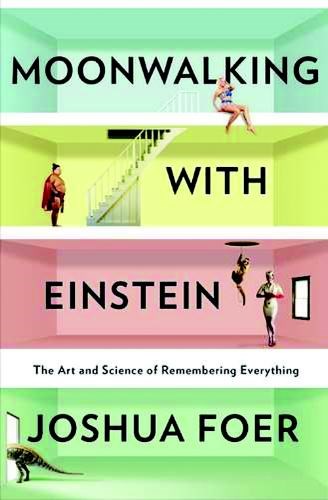Moonwalking With Einstein: The Art and Science of Remembering Everything
by Joshua Foer
Smartphones are eroding our memories.
With these devices, we don't need to remember phone numbers, birthdays, email addresses and other contact information for our friends and family.
We don't need to remember the dates, times and locations of upcoming appointments.
With the Prince George Public Library app (available for Blackberry, iPhone and Android), you don't have to remember when your books and DVDs are due.
With the Google app, anything you've forgotten can be looked up.
If you've forgotten the address to your favourite restaurant, the showtimes for the movie you want to see tonight, or who scored the game-winning goal for the Canucks against the evil Calgary Flames, there's an app for that.
The decline of our ability to remember began much sooner than the appearance of smartphones, also thanks to an amazing piece of technology.
When Gutenberg created the printing press, making possible the mass production of the written word, important holy books, scientific data, important historical events and medical cures no longer needed to be committed to memory and passed down from generation to generation.
We still have rely on memory but it's been sidelined by technology. Rock stars amaze us by being able to play two hours of music without glancing at anything more than their set list but more than a few now rely on teleprompters in case they forget the lyrics.
Baseball pitchers and hitters are well-known for recalling pitches and pitch counts at key at-bats in a game, even though video prompts their memory to the point that they don't remember the moment, they remember the video of the moment.
On the flip side, there is no such thing as a photographic memory. Instead, there are methods to build your memory skills, dating back to the ancient Greeks. The great mnemonists, the fancy words for people who work on their memory skills, insist they have no special mental abilities and brain scans show that's true.
Enter Joshua Foer. In his book Moonwalking With Einstein: The Art and Science of Remembering Everything," Foer explains how he went from covering the U.S.A. Memory Championships as a writer in 2005 to winning the speed cards category the following year by memorizing the order of two shuffled decks of cards in one minute and 40 seconds, shattering the previous American record by 15 seconds.
It's a great book, filled with hilarious stories, because successful memory techniques involved creating elaborate tales to cue the memory. In his championship moment, Foer recalls how Michael Jackson (the king of hearts) defecating (two of clubs) on a salmon burger (king of clubs) and capturing his farts (queen of clubs) in a balloon (six of spades) helped him win the title.
Moonwalking With Einstein is available in the non-fiction section at the Prince George Public Library and is also available as an audiobook through the Library To Go database on the library's website.
-- Reviewed by Neil Godbout, the communications co-ordinator at the Prince George Public Library.
The Assault on Reason
by Al Gore
Al Gore, whatever his personal faults, worked his way up from congressman to senator to vice-president, during a political career of over two decades.
His book, The Assault of Reason, explores how faith in people's ability to govern themselves through rational debate is under assault.
During the age of print media, citizens could meaningfully participate in political debates in the public sphere. Public debates involved a two way conversation between the citizens and their government.
In the age of television media, where there is a heavy concentration of media ownership, access to the national media is limited to those people and organizations with the funds necessary to purchase media time.
Conversations in the public sphere have become one way and increasingly propagandistic.
The citizens have become passive receivers and are unable to meaningfully contribute to the marketplace of ideas.
He uses the former George W. Bush government like a case study. Admittedly he has an axe to grind with that administration. However, much of what he said resonates.
The administration did use the fear of terrorism to undertake numerous questionable actions (e.g. invasion of Iraq, spying on U.S. citizens, etc.) that likely breeched domestic and national laws. Fear is a powerful emotion.
That emotion leaves us vulnerable to people who offer simple solutions for complex problems.
Effective control of the national media stifled any meaningful debate concerning issues such as the war in Iraq or maltreatment of suspected terrorists, for years.
In fact, it wasn't necessary for the government to censor the media, it censored itself.
One of the interesting questions raised is whether government officials actually believed its own press clippings. The administration selectively listened to evidence that supported their existing beliefs and ignored factual evidence to the contrary.
And not only did they use questionable evidence to sell their view of reality to the public, they didn't let reality confirm or deny their pre-existing beliefs.
The administration lived in a bubble insulated from external reality, making disastrous decisions based on beliefs and desires, not based on the best advice and scientific evidence available.
The experience of eight years of the George W. Bush government gives a clear warning of what can happen when governments try to create their own reality instead of living in reality.
Solid evidence based on the best available science can be ignored. Leaders do not always learn from experience, but instead may create their own fantasy worlds.
Al Gore's book can be found in the non-fiction section at the Prince George Public Library and as an audiobook on the Library To Go database at the library's website.
-- Reviewed by John Shepherd, former board trustee at the Prince George Public Library



